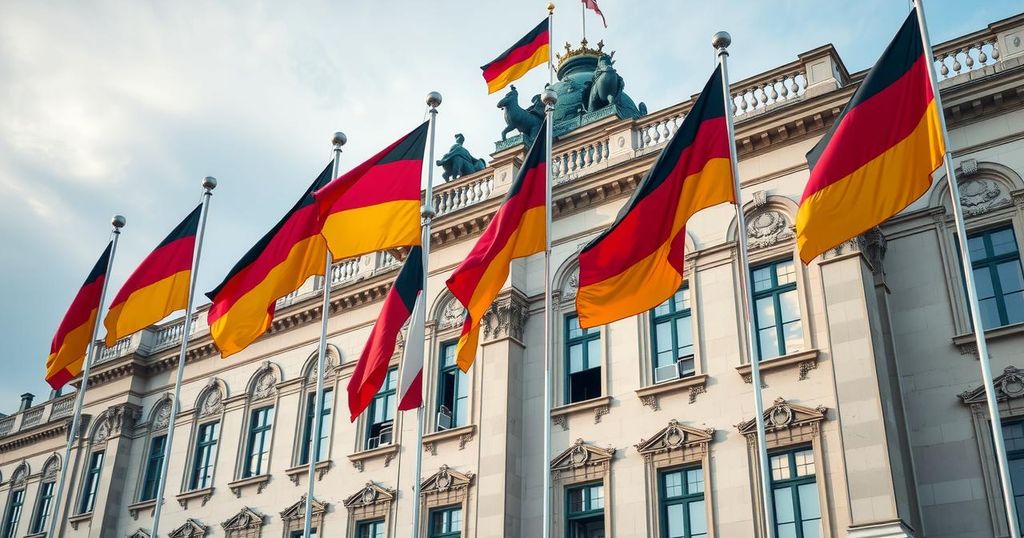World news
AFD, ALTERNATIVE FOR GERMANY, ASIA, BELLEVUE PALACE, BERLIN, CHRISTIAN LINDNER, DEMONSTRATIONS, ELON MUSK, EUROPE, FREE DEMOCRATS, FRIEDRICH MERZ, GERMANY, GOVERNMENT, MIDDLE EAST, OPPOSITION CRITICISM, POLITICS, POPULISM, SAUDI ARABIA, SCHOLZ, SOCIAL DEMOCRAT, TALE, UKRAINE
Ethan Kumar
0 Comments
German President Dissolves Parliament, Announces February Elections
German President Frank-Walter Steinmeier has dissolved parliament and scheduled snap elections for February 23, following Chancellor Olaf Scholz’s loss of a confidence vote. Steinmeier stressed the necessity for a stable and effective government amid rising political turmoil and discussed potential foreign influences on the election process. The results may prove crucial in the wake of heightened discussions regarding security and immigration, especially after a recent violent incident linked to the far-right AfD party.
German President Frank-Walter Steinmeier has officially dissolved the German parliament, announcing that snap elections will take place on February 23. His declaration follows the recent collapse of Chancellor Olaf Scholz’s coalition government after Scholz lost a crucial confidence vote. In his speech at the Bellevue Palace in Berlin, Steinmeier emphasized the need for governance capable of addressing current challenges and ensuring parliamentary reliability amidst a climate of rising political and social unrest.
As a consequence of losing the support of Finance Minister Christian Lindner’s Free Democrats, Scholz will now serve as a caretaker chancellor until a new government is formed. This political instability occurs in the wake of a deadly car-ramming incident at a Christmas market, reigniting discussions on security and immigration policies. The suspect in this attack, Taleb al-Abdulmohse, has been linked to the far-right Alternative for Germany (AfD) party, known for its Islamophobic sentiments.
President Steinmeier also cautioned against the potential for foreign interference in the electoral process, with particular reference to the influence of social media platforms, urging for a transparent and fair electoral campaign devoid of hatred and intimidation. He stressed that the upcoming government will face significant challenges, including economic instability, regional conflicts, and pressing debates about immigration and climate change. Polling trends suggest that conservative candidate Friedrich Merz is favored to succeed Scholz, despite mainstream parties’ reluctance to form coalitions with the AfD, complicating the political landscape further.
The political tension in Germany has escalated following a confidence vote loss for Chancellor Olaf Scholz, stemming from the exit of his coalition partner, leaving him without a parliamentary majority. The dissolution of the parliament by President Steinmeier signifies an urgent need for a functionally stable government amid sociopolitical challenges, including rising security concerns post a significant violent incident. The upcoming elections and discussions surrounding party alliances will be critical in shaping Germany’s future governance, particularly with the growing influence of the far-right AfD party and the contentious environment surrounding immigration and foreign impacts on domestic politics.
In summary, the dissolution of Germany’s parliament by President Steinmeier marks a pivotal moment in the nation’s political landscape, prompting snap elections amid a backdrop of instability and rising threats to social cohesion. Chancellor Olaf Scholz’s caretaker leadership during this turbulent period highlights the urgency for a government adept at navigating multifaceted challenges. The impending elections will not only determine the nation’s leadership but also shape its approach to pressing issues such as security, democracy, and international relations.
Original Source: www.aljazeera.com




Post Comment